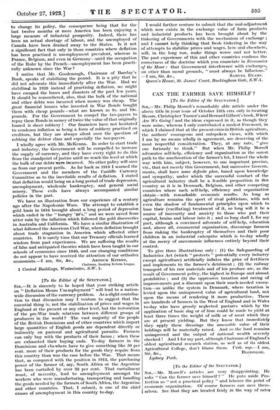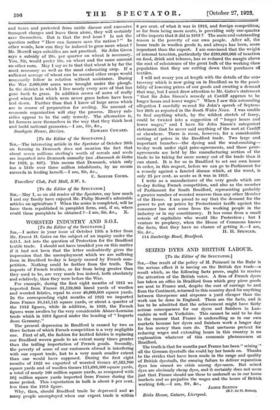[To the Editor of the SPECTATOR.] SIR,—Mr. Morrell's articles are
very disappointing. He asks " Can the farmer save himself ? " He puts aside Pro- tection as " not a practical policy " and labours the point of economic organization. Of course farmers can save them- selves. See that they arc treated fairly in the way of rates and taxes and protected frOm cattle disease and excessive transport charges and leave them alone, they will certainly save themselves. But is that the real issue ? Is not the question rather " How can farmers save the nation ? " In other words, how can they be induced to grow more wheat ? Mr. Morrell says subsidies are not practical. Sir John Green says a subsidy of 20s. per quarter on wheat is necessary. You, Sir, would prefer 10s. on wheat and the same amount on other corn. May I say as to that that wheat is by far the most necessary as well as the most exhausting crop. If a sufficient acreage of wheat can be secured other crops would necessarily follow in rotation without assistance. During the War 2,000,000 acres were brought under the plough. In the district in which I live nearly every acre of that has gone back to grass. In addition scores of acres of really good wheat land which were never grass before have been laid down. Further than that I know of large areas which are in course of preparation for seeding. No amount of economic organization will stay the process. Heavy sub- sidies appear to be the only remedy. The alternative is, let farmers save themselves in the way that they think best and build national granaries.—I am, Sir, &c.,















































 Previous page
Previous page